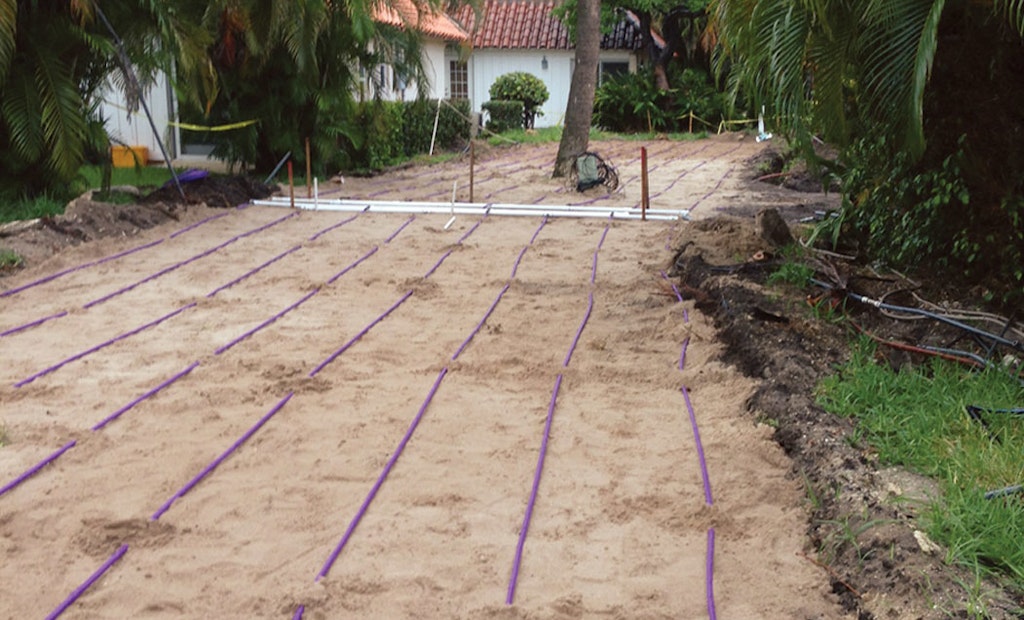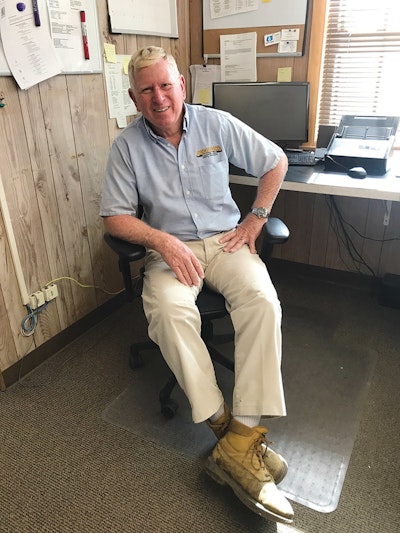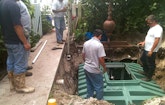
A Netafim dripline is laid out with a BioMicrobics treatment system. Lots in Florida can be tight and systems complex.
Interested in Education/Training?
Get Education/Training articles, news and videos right in your inbox! Sign up now.
Education/Training + Get AlertsName and title or job description: Gary Pinkas, owner
Business name and location: Bradford Septic Tank Co., West Palm Beach, Florida
Services offered: We do septic installations for new construction and replacement systems including aerobic treatment units, grease trap installations, septic and grease trap pumping, repairs and inspections.
Age: 61
Years in the industry: 43 years
Association involvement: My father, Pete Pinkas, was one of the founding fathers of the Florida Septic Tank Association, which is now the Florida Onsite Wastewater Association. I have been a member since those early years. I served one term as president in 2000, and I’ve been on the board.
Benefits of belonging to the association: The association keeps us involved and informed on state legislation. We have a lobbyist. Years ago, when the State 64E Code regarding onsite sewage and treatment and disposal systems was written, the association worked with the Florida Department of Health, so we felt we had some input into the development of the code. Without the association, we would likely have rules that would be impractical. Being in the association also allows us to meet other people in the industry at association events and gives us credibility with homeowners and inspectors. It’s nice to say to a homeowner that we’re members of the association, and I think the health department has more respect for you, also.
Biggest issue facing your association right now: There’s been a lot of talk regarding moving the regulation of the septic industry away from the Department of Health and placing it under the Florida Department of Environmental Protection. Supposedly it will be a straight-across change and the rules and regulations will stay the same. But, as with anything else, when a new department takes over, there’s always some changes. No one knows how the details will work out. Some feel it could be a change for the better, and some feel it could be disastrous. But most are confident we will see this transition in our future.
Our crew includes: My wife, Janet, is the office manager, running the side of the business that takes the most time and patience. Gerrit Alvarez, full-time dispatcher, manages phones and schedules service calls for our three vacuum trucks. Our three pumpout drivers are Thomas Maxey, Kevin Smith and J.T. Torres. Equipment operators are Johnnie Jackson, Jose Gomes, Martel Perdue and David Willis. Brian Tankersley, full-time mechanic, does a great job maintaining all our equipment and helps on job sites with mechanical and electrical issues such as lift stations. Rico Ortiz does our repair permit submittals and maintains the ATUs under contract.
Typical day on the job: I start my day by walking the yard before anyone else arrives, looking at equipment and supplies for anything that needs attention. Then I’ll come into the office, go over all the schedules for the crews, get the paperwork together they’ll need for the day and hand out work assignments. At 8 a.m., our office staff starts the day and our phones start ringing, so I usually spend some time talking to customers and answering email. When I leave the office, I do site visits for proposals, check on crews and meet with inspectors when needed. If we have a large or tight job, I will be there for the tank installation. I end the day back in the office wrapping things up and getting ready for the next day.
Helping hands – Indispensable crew member: My most unique and indispensable crew member — Maxey — has been talking about retirement for so long that customers are surprised to hear he still comes to work every day. He’s been here as long as I have and runs a pump truck, now with an assistant. He has a remarkable memory and knowledge of septic system construction in Palm Beach County, which is an asset every day. He also has a personality that makes him a joy to work with and popular with customers, who often ask for him by name.
The job I’ll never forget: Recently we had to demuck for a tank set. Due to the depth, pilings were not a cost-effective option. We wound up digging a hole over 20 feet deep, which is an impressive hole in South Florida on a beach lot. We used a trackhoe with a 40-foot boom and hydraulic pump with an 8‑inch discharge to keep the site dewatered. For a 20-by-20-foot excavation, we used about 120 cubic yards of rock. With the slopes and doing it by (U.S. Occupational Safety and Health Administration) standards, it was quite a large area we were utilizing for this tank set. With so many years of experience in this county, it’s nice to have the confidence and knowledge to do big installation jobs — and it’s fun, too! We have our own dig boxes to hold back all the sand and then rent different trackhoes and cranes depending on the size of the job.
My favorite piece of equipment: My overall favorite is the Terralift ground-fracturing machine. I call it my chitty-chitty bang bang. I bought it when I first heard about it about 30 years ago. It can save a customer thousands of dollars by rescuing a drainfield when an impervious biomat layer develops when a drainfield is fairly young. Now that the code requires multichambered tanks and outlet filters, I don’t see much of that kind of failure, which is a good thing. But in years past, the Terralift gave homeowners who had unknowingly abused their septic system a second chance.
Most challenging site I’ve worked on: Years ago we installed the treatment systems for a state park in Palm Beach County. All the systems were rockless, which was innovative back then, before ATUs. The main systems for the auditorium and picnic pavilions were on the mainland, but the beach at this park is on a barrier island with access being a boardwalk over a quarter mile long. All materials, tools and personnel had to be transported by golf carts (provided by the state). It was tedious and time consuming, and we had to consider each trip carefully so as not to forget something.
The craziest question I’ve been asked by a customer: A customer once asked me what all those colorful things floating in the tank were. Lucky for me, as I was considering how to word my answer, she realized what they were, turned red and walked away. In our office, we are still amazed by customers who call up with a septic backup but consider themselves to be excellent at managing their septic system because they have not had the tank pumped in 15, 20, 30 years.
If I could change one industry regulation, it would be: There’s two things. First, I think all tanks should have (access) to grade. This is an issue the association brought up about 20 years ago, and I think it would be a long-term benefit for homeowners. It would allow them to know the location of their septic system so they could avoid landscaping in the area and it would prevent damage to the tank lid by an inexperienced (or lazy) pumping technician. Second — and I know I’m preaching to the choir — is mandatory inspections. Everyone in our industry often sees systems that are compromising to the environment, but if the homeowner doesn’t have the interest in repairing the system, nothing is done and this gives our industry a black eye that is not deserved.
Best piece of small-business advice I’ve heard: The advice that I’ve been able to put into practice and that’s worked for me is to just show up every day and be honest. Sometimes showing up just means getting through a bad day and coming back tomorrow. And if you are honest in what you tell your customers, you don’t have to remember any lies. … You just tell it the way it is and people will pay you for that. Honesty also includes saying you don’t know sometimes.
If I wasn’t working in the wastewater industry, I would: Probably have gone into aviation, something I love. I am a pilot and own a plane, which is my biggest stress reducer. When I was young, I worked as a scuba dive master and a guy I worked for told me, “If you want it to be a hobby, keep it as a hobby. Don’t turn it into a job because it will no longer be a hobby.” I stayed in the septic business, and I have to say I have enjoyed this career and the people I have met in it.
Crystal ball time – This is my outlook for the wastewater industry: With the increase in attention to environmental issues I see a future of increased scrutiny and innovation. I think there will be more installations of advanced treatment systems. There’s a lot of talk in Florida about nitrogen reduction in effluent and the effect on surface water quality. With changes in state regulations and public interest, I think the industry will step into the future and onsite wastewater treatment will continue to be an economical and environmentally responsible technology when properly installed and maintained.







